
Jacob Russell was at work when he fell to the ground with an “excruciating” sensation in his lower back. The pain, possibly related to a kidney stone, was gone the next day. Unfortunately, the bill for his short hospital visit would become its own source of pain.
It did not matter to Walker Baptist Medical Center in Jasper, Ala., that Jacob, 25 and a father of two young children, could not pay the bill. Jacob tried to negotiate, but the hospital billers would not budge.
To keep their tax status, nonprofit hospitals must allow some patients to apply for financial assistance for medical bills. But Walker Baptist did not tell Jacob that he may have been eligible for this program, sometimes called charity care.
“The hospital never mentioned anything about it,” he said.
Jacob was unsure of what to do. One day, though, his wife was scrolling through TikTok and saw a video about Dollar For. After learning about its work winning medical bill forgiveness for people around the country, the couple filled out Dollar For’s eligibility form. Before long, Jacob heard back from a Dollar For Patient Advocate.
The Patient Advocate worked with Jacob to collect the information he would need to apply for medical bill relief. A week after the application was submitted, he received a call from staff at Walker Baptist, who said that the hospital had forgiven Jacob’s bill.
Dollar For’s help came at a crucial time for Jacob. The day after collapsing at work, he suffered a shoulder injury on the job, which required him to repeatedly lift and move heavy materials. His paychecks shrank as physical therapy and recovery kept him from working as many hours as he had been.
The debt relief would become even more important. Shortly after he returned to work full time, Jacob was laid off. Had the debt remained, Jacob and his wife would have had to spend money on medical bills that they had budgeted for food, diapers and the increasingly expensive gas Jacob needed for his new job as a delivery driver.
The process of fighting for medical bill forgiveness left Jacob with three key lessons. If you get a bill that seems too high, “stay determined” that you can do something about it, he said. Second, keep your bills, documents and pay information organized and easily accessible during the application process.
Jacob’s third piece of advice goes back to his wife’s discovery of the TikTok video. He had never heard of Dollar For, but he was willing to give it a shot and applied. He’s glad he did.
The lesson? “Don’t be afraid to ask for help.”
